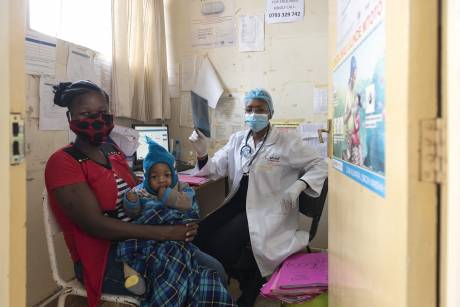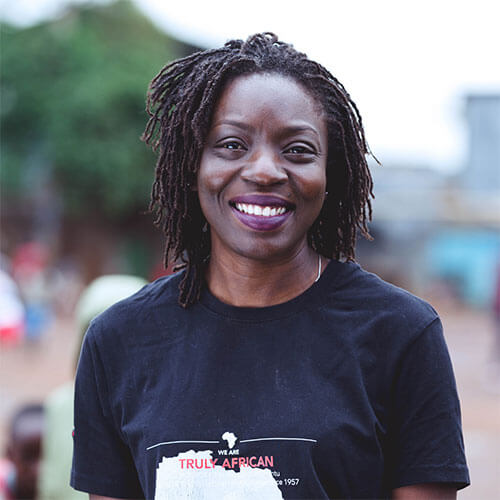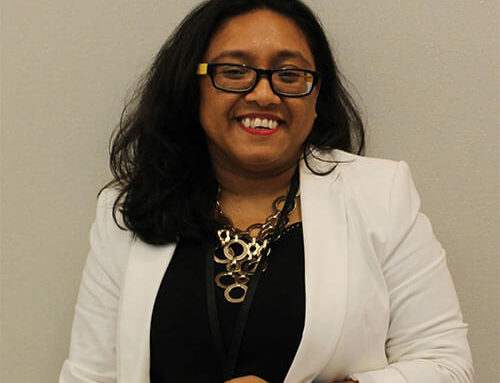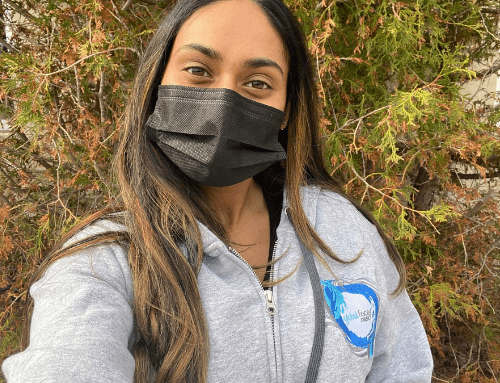Onome Ako, Executive Director, Amref Health Africa in Canada
A few nights ago, as usual, my 4-year-old daughter crawls into my bed in the middle of the night. She normally falls right to sleep. Not this night. She fidgets a little, and then cuts right to it: “Mommy,” she asks “will coronavirus ever go away?” Of course, darling, I respond. That was the only thing I could muster at 2am without having a full-blown conversation. Re-assured, she falls right to sleep.
I have had several conversations with my daughter about COVID-19 and normalizing it as much as I can in our everyday lives by supporting her to take precautions, such as washing her hands frequently. But she has also associated COVID-19 with not seeing her friends, not going out to the parks, and not going to school. Understandably, she wants it over, like all of us.
Hours later, I lay awake, thinking of the many ways our lives have been disrupted by COVID-19.
I think of how my role as a mom has changed. How, like many other moms, I am juggling (or struggling) with full-time working from home, homeschooling and caregiving for my aging parents. I remind myself constantly to pace myself and enjoy the time that I have with my daughter, and my mom. Once our lives go back to the new normal these family moments will not be re-gained.
I think of moms who have lost the fight to COVID-19; or lost loved ones in the times of COVID-19. Frequently, not in the presence of their loved ones.
I think of moms on the frontlines of COVID-19 caring for patients or family members who are sick. Women make up 70% of the social and health workforce.
I think of moms who have lost their jobs, struggling to cater for their families, not knowing how their family’s basic needs will be met. Women are over-represented as informal workers and daily-wage earners, and they spend 3 times as many hours than men in unpaid care and domestic work.
I think of moms who have been plunged further into the dark world of domestic violence. Mounting data show that domestic violence is rising as a result of restriction on movements that is cutting off support networks.
I think of moms who do not have access to basic health care as health systems focus their resources on battling COVID-19. If resources are not allocated for reproductive and sexual health, there could be a rise in maternal mortality, particularly in the countries in Africa where Amref Health Africa works. Health systems in most of these countries are already fragile, making access to basic maternal care a challenge for women at the best of times.

As I quickly stop my alarm so it does not wake up my daughter who is still fast asleep, I think of how the needs of women and moms need to be addressed and how we still have so much work to do, and so much to learn, when it comes to gender and health equity here in Canada and around the world.
According to The Lancet, policies and public health efforts have not addressed the gendered impacts of previous disease outbreaks, and the response to COVID-19 appears no different so far. Recognizing the extent to which disease outbreaks affect women and men differently is a fundamental step to understanding the primary and the secondary effects of a health emergency on different individuals and communities, and for creating effective, equitable policies and interventions.
This is why we need to ensure that essential health care for women continues during this global pandemic. The provision of sexual and reproductive health services, including maternal health care and gender-based violence related services, are central to the health, rights and well-being of women and girls.
As UN Women has pointed out, the diversion of attention and critical resources away from these provisions may result in exacerbated maternal mortality and morbidity, increased rates of adolescent pregnancies, HIV and sexually transmitted diseases. To delay any of these services could mean a death sentence for many more women. It is a lesson that the global community should have learned following the Ebola outbreak centered in West Africa in 2014-2016, which led to a decrease in women accessing family planning services, attending pre-natal care, and giving birth in health facilities – all of which are significant drivers of increased maternal and newborn deaths.
The Canadian government has played a significant role and has stepped up in the global response to COVID-19. Indeed, according to Prime Minister Justin Trudeau, “none of us is immune to the effects of COVID-19, and none of us can beat the virus alone, only by protecting each other can we protect ourselves.” As a Canadian, I’m proud that we continue our global outlook at a time that is also so difficult for Canadians.
On this Mother’s Day, let’s join together to encourage Canada to continue its global feminist leadership, and encourage other countries, to ensure that essential health services for women are part of an integrated response to COVID-19 to give a brighter future for our moms.





